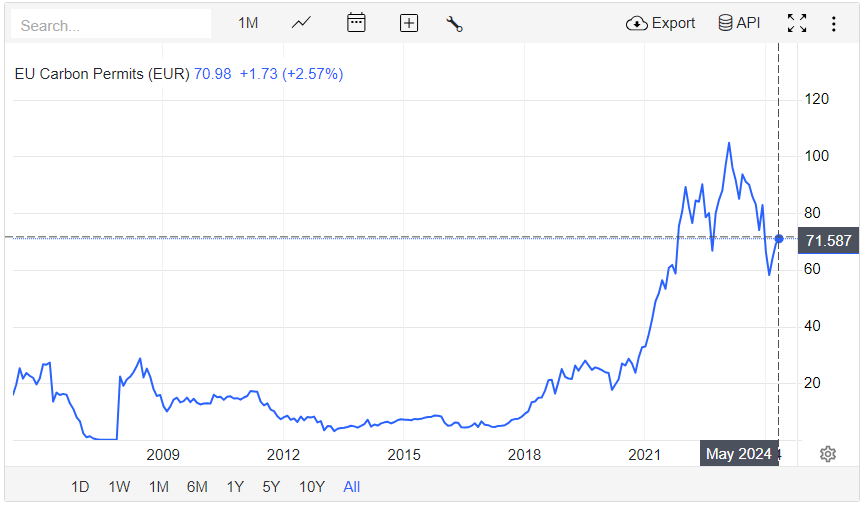Price drop partly politically desired / Prices of €100 or significantly higher to be expected in the medium term
“The problem is not the ETS price, but the decline in industrial production Europe,” said MEP Peter Liese, environmental policy spokesperson for the largest political group in the European Parliament (EPP, Christian Democrats) and rapporteur on the revision of emissions trading, in view of the current discussions on the price of certificates in the EU’s emissions trading system. In view of a slight drop in the ETS price compared to last year, Marion Labatut, Director of European Affairs at the French energy supplier EDF, for example, said that low CO2 prices were slowing down the decarbonization of the electricity sector. The Commission should therefore avoid bringing even more certificates onto the market.
The ETS price, which was up to €100 on some days last year, is currently at a level of around €70. This means that this important value, which is a price signal for decarbonization, is still well above the level of recent years. From 2012 to 2018, the price was stable below €20, and between 2018 and 2021, it was between €20 and €30. “For a long time, €30 was considered a CO2 price to aim for. We are now well above that. That has to be the case because we have significantly raised our ambition level. But it is by no means desirable for the CO2 price to quickly rise above €100 again,” emphasizes Liese.
“Too high an ETS price can accelerate the decline in industrial production in the European Union, because the decarbonization in industry does not work that quickly. There are many great projects in this area, but most of them will only be advanced to the point where industrial production with extremely low emissions or no emissions at all will be possible towards the end of the decade. However, we do not need a deindustrialization of Europe, but a decarbonization of industry. Firstly, because otherwise we will lose our prosperity and secondly, because otherwise we will not be a role model for the rest of the world,” explained the MEP.
In the negotiations on the EU ETS, Liese and his group therefore insisted that the main effects of the tightening of the European climate targets should not take effect until 2027. The reduction in free allowances will only begin at this time and more allowances will be made available in the short term until 2027 by frontloading allowances and intervening in the market stability reserve. “This takes account of the fact that investments in renewable energies and the transformation of industry take time and that these investments have been made even more difficult over the last two years by the effects of the Russian aggression and the need to replace Russian gas. Part of the price drop from €100 to €70 was therefore politically intentional. A second element is the decline in industrial production. We must all work together, the Member States and the European Union alike, to ensure that industry receives a tailwind and not a headwind. To achieve this, we need to speed up approval procedures, e.g. for renewable energies and hydrogen projects, and not place additional burdens on industry, i.e. by banning chemicals.”
“In the long term, however, the ETS price will rise again to €100 and probably well above that. Therefore, no one should be under any illusions: those who invest in clean technologies now will benefit in the long term. Anyone who thinks they can simply carry on as before in the coming decades will be punished,” says the rapporteur of what many consider to be the biggest climate protection law of all time.
Contact for questions: This email address is being protected from spambots. You need JavaScript enabled to view it.


